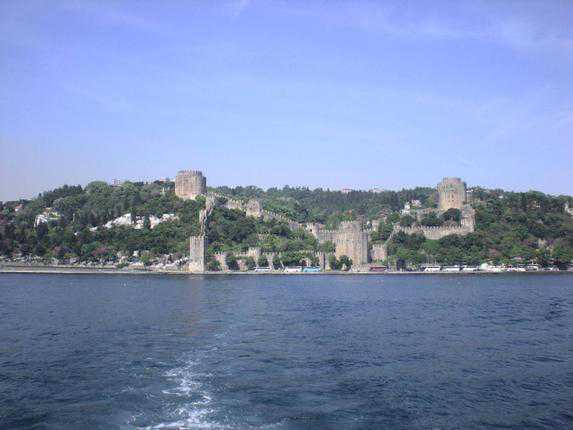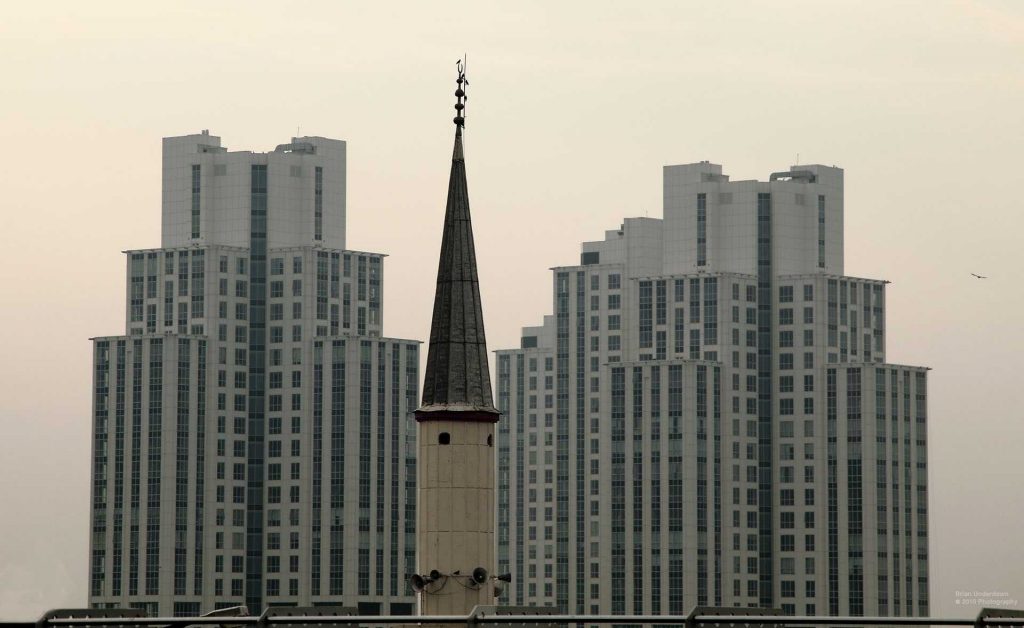By Wayne Madsen
Online Journal Contributing Writer
Dec 10, 2008, 00:22
(WMR) — Tuncay Guney, the Turkish National Intelligence Organization (MIT) agent who was a key player in the right-wing “Deep State” Ergenekon movement that attempted to overthrow the Turkish government, spent time in North Jersey in the months prior to the 9/11 attacks, according to a reliable source who spoke to WMR.
Guney now claims to be a rabbi but his status as a rabbi has been rejected as a falsehood by Turkey’s Jewish community leaders. Guney is listed as a rabbi at Jacob House (“B’nai Yakov”) Jewish Community Center in Toronto but the Toronto Board of Rabbis and the Turkish Jewish Congregation have no records of a Rabbi Tuncay Guney or “Daniel Levi,” an alias used by Guney. It is believed that “Jacob House” is a front for intelligence operations and not an actual synagogue. Jacob House shares an address with the New York Institute, which also maintains an address in New Jersey.
Guney was arrested by Istanbul’s Anti-Smuggling and Organized Crime Department on March 8, 2001, after a police search of his home turned up two guns, fake license plates, a number of Turkish identity cards, over a hundred fake diplomas, and other Ergenekon evidence. The head of the Istanbul police unit, Adil Serdar Saçan, suspected Guney was a key player in Ergenekon. However, Sacan was, himself, later arrested and charged with being a member of Ergenekon. However, WMR has learned from its Turkish sources that Sacan is honest and was set up in an attempt to tarnish his image after he discovered an Israeli connection to the powerful Ergenekon movement.
As a member of the Turkish police JITEM unit, Guney reportedly spied, under cover as a journalist, on Iraqi Kurdish leaders Massoud Barzani and Jalal Talabani and Lebanese Hezbollah leader Hassan Nasrallah. Talabani is now the President of Iraq.
After Guney’s release on bail on March 9, 2001, Şenkal Atasagun, MIT’s undersecretary, asked the CIA to exfiltrate Guney to the United States. Guney was flown on Turkish Airlines to New York. Guney eventually ended up, according to our sources, living in North Jersey and making a living pumping gas.
Guney lived in the “973” area code zone, an area that encompasses East Rutherford and Fairlawn, towns that were centers of activity for Israeli Mossad Urban Moving System operatives who were spotted celebrating the 9/11 attacks from at least two locations — Liberty State Park in Jersey City and an apartment complex on the Jersey Palisades above Weehawken, the headquarters of Urban Moving Systems. The FBI and CIA later identified Dominick Suter, the manager of Urban Moving Systems, as a Mossad intelligence officer. Five Urban Moving Systems employees were arrested in their van in East Rutherford during the afternoon of September 11, 2001, after they were seen traveling toward the Lincoln Tunnel to Manhattan. Their Urban Moving Systems van tested positive for the presence of explosives. Suter fled the United States and the five Israelis, some of whom were identified as Mossad in an FBI/CIA database, were released after a few months in jail after heavy pressure was applied on the U.S. government by Israel.
Guney is also suspected of acting as an agent for Mossad, as well as the CIA. His presence in North Jersey, a “hot zone” for Israeli intelligence before and during the 9/11 attacks, points to a possible Turkish connection to the attacks.
On August 7, 2005, WMR reported on details of the apprehension of the Israelis for their false flag actions: “Jersey City was a major base of operations for the 1993 World Trade Center attack. The Ryder van used in that attack was rented from a Jersey City rental agency . . . there was a call placed to the Jersey City Police Department that claimed ‘Palestinians’ in Arab clothes were seen celebrating the attacks. Although the Jersey City Police discovered their 911 system tapes on September 11, 2001 disappeared from their servers and achives after ISI [of Mount Laurel, NJ] took over the contract, some tapes implicating “Arabs” found their way into the hands of WNBC-TV in New York in June 2002. WNBC played transcripts of 911 calls from the Jersey City Police:
Dispatcher: Jersey City police.
Caller: Yes, we have a white van, 2 or 3 guys in there, they look like Palestinians and going around a building.
Caller: There’s a minivan heading toward the Holland tunnel, I see the guy by Newark Airport mixing some junk and he has those sheikh uniform.
Dispatcher: He has what?
Caller: He’s dressed like an Arab.
“It is clear that the Jersey City Police Department’s 911 call tapes were manipulated to delete any calls that might implicate the Israelis. The one call provided to WNBC was clearly an attempt at a ‘false flag” operation implicating ‘Palestinians’ wearing ‘sheik uniforms’ as the culprits in at least one of the white vans driven by Israeli ‘movers’ on the morning of September 11. After the van was traced to the Israeli moving company, the BOLO [Be On Look Out for message] went out for the arrest of the vehicle’s driver and passengers. An East Rutherford policeman directing traffic away from the closed Lincoln Tunnel on Route 3 East noticed the van was driving slowly on the service road towards the tunnel. The tag of the vehicle was only off by one letter from what was contained in the BOLO (JRJ 13Y) and the front New Jersey plate had been removed. It is very possible that to confuse the police, the Israelis were using NJ plate JRJ 13Y as the rear tag on two white vans – the one sighted in Liberty State Park and the other in Maria’s apartment building parking lot. In fact, local police reported a number of white van sightings during September 11, with a number of them phoned into the police. Maria told ABC News she phoned tag number JRJ 13Y to the Jersey City Police after seeing the Israelis driving in a white van celebrating the first plane’s impact, while Liberty State Park witnesses said the same tag number — JRJ 13Y — had been passed to the police and FBI after a white van with ‘celebrating Arabs’ had been chased from the park by the park’s chief ranger after the first plane impact.[11] It was clear that officials of New Jersey’s Department of Environmental Protection in Trenton, which has authority over the state’s parks, ordered Liberty State Park officials not to talk to the media about September 11 and the Israeli van.”
The man who then New Jersey Governor Jim McGreevey placed in charge of his liaison to New Jersey’s security and law enforcement agencies, Golan Cipel, later was allegedly identified by U.S. intelligence as a gay “honey trap” Mossad officer tasked with entrapping and blackmailing McGreevey. McGreevey resigned as governor after details of the homosexual affair became public.
Ergenekon has been accused of carrying out terrorist attacks and assassinations in Turkey as “false flag” operations to discredit, undermine, and eventually overthrow Turkey’s Justice and Development Party (AKP) government of Prime Minister Recep Tayyip Erdogan. Former FBI Turkish and Persian translator Sibel Edmonds told the Sunday Times of London earlier this year that her translations of wiretaps of Turkish, Iranian, Israeli, and American individuals pointed to Turkish training for the 9/11 hijack ring. Edmonds said that an “Al Qaeda” leader, a Syrian named Louai al-Sakka, had trained 9/11 hijackers at a military base in Turkey, under the watchful eyes of the Turkish military, which we now know was riddled with Ergenekon agents up and down the chain-of-command, four star generals to non-commissioned officers. Al-Sakka was convicted in 2007 for his role in a series of 2003 bombings in Istanbul that targeted the British Consulate, two HSBC bank branches, and two synagogues and his now serving a life prison sentence. The Turkish ring may have been involved or known about several beheadings of Western prisoners in Iraq that were blamed on “Al Qaeda.”
Philip Giraldi, a former CIA station chief in Istanbul, wrote the following in the Dallas Morning News: “Sibel Edmonds makes a number of accusations about specific criminal behavior that appear to be extraordinary but are credible enough to warrant official investigation.”
Coupling the Turkish official investigation of Ergenekon with Edmonds’ information, there is more than a smoking gun pointing to 9/11 as a “false flag” operation involving Turkish, Israeli, and U.S. intelligence operatives. The Saudi and Pakistani financial connection to the 9/11 hijackers and the “false flag” operation has already been well-documented.
It is time for the incoming Obama administration to seriously consider appointing a new 9/11 commission, sans enablers and possible conspirators in the 9/11 false flag attack on the United States. Thousands of pages of documents are now available in Turkey, the United States, Britain, India, France, and other countries that will prove that 9/11 involved a network much larger than a former CIA asset hiding in an Afghan cave, Osama Bin Laden, and 19 ne’er-do-well “hijackers,” some of whom were more interested in going to strip joints and bars in the days before they decided to take express flights to “heaven” to spend eternity with Allah.
Previously published in the Wayne Madsen Report.
Copyright © 2008 WayneMadenReport.com
Wayne Madsen is a Washington, DC-based investigative journalist and nationally-distributed columnist. He is the editor and publisher of the Wayne Madsen Report (subscription required).
Copyright © 1998-2007 Online Journal
Email Online Journal Editor
Source: onlinejournal.com, Dec 10, 2008
[2]
Mossad implicated in a coup plot in Turkey, a NATO country; CIA fingerprints also found on attempt
By Wayne Madsen
Online Journal Contributing Writer
Dec 4, 2008, 00:20
(WMR) — Fresh from revelations, reported by WMR, that Israel’s Mossad and Chabad House-based criminal syndicates were targets in a criminal gangland retribution attack by a notorious Muslim gang in Mumbai, comes word that Mossad has, once again, been implicated in an intelligence and criminal network, this time in Turkey.
What makes this latest example of Israel’s failure to stem the criminal activities of its intelligence service and criminal syndicates worse is that Turkey, unlike Israel, is a NATO ally of the United States and, therefore, the United States is bound by treaty to protect NATO allies from aggression by non-NATO states, including Israel.
The Turkish and other Middle East media are reporting that the Mossad has been fingered in connection with a right-wing Turkish criminal and intelligence gang, known as Ergenekon, that stands accused of attempting to overthrow Turkey’s democratically-elected Justice and Development (AKP) Party of Prime Minister Recep Tayyip Erdogan and President Abdullah Gul. Several Turkish papers have named a Turkish rabbi, Tuncay Guney, aka Daniel T. Guney and Daniel Levi and code-named “Ipek” or “Silk,” as having served as a double agent for the Turkish National Intelligence Organization (MIT) tasked with infiltrating the shadowy but powerful “state within a state” group Ergenekon. Guney had been arrested by Turkish authorities in 2001 for distributing fake drivers’ licenses and phony license plates for luxury cars. A document recently uncovered by the Turkish press revealed that Guney had also infiltrated a police intelligence unit (JITEM) working with Ergenekon to destabilize Turkey. Guney was exfiltrated to the United States and he now heads up the B’nai Yaakov Synagogue and Community Center in Toronto, Canada. Guney has denied that he has been an agent for Israel, Turkey or the United States but the MIT has confirmed the document identifying Guney as an agent for MIT is authentic.
The Turkish daily Hurriyet has reported that Guney served in MIT’s Counter-terrorism Unit (CTU) and in the MIT unit that monitors Iran. Hurriyet also reported that Guney had developed a contact at the Iranian consulate in Istanbul, Muhsin Karger, the consulate’s political affairs undersecretary.
Guney also has claimed to be a journalist and it is also alleged that he was a member of the PKK. Silvyo Ovaydo, the leader of the Turkish Jewish community, called Guney a fraudulent rabbi and said he was not even registered as a rabbi at the B’nai Yaakov synagogue in Toronto. Guney is said to have once worked for Islamist media organizations in Turkey but suddenly converted to Judaism and became an “instant rabbi” in Toronto.
At the heart of the Ergenekon story lies Mossad and its reported attempts to turn Turkey into another Lebanon or West Bank/Gaza, a country wracked by internal strife and constant warfare that would usher into power a strong right-wing military dictatorship. In the trial of one of the accused murderers of Turkish-Armenian journalist Hrant Dink, the lawyer for one of the accused murderers asked another accused murderer, Erhan Tuncel, a one-time police informer like Guney, if he had an Israeli girlfriend. Tuncel refused to answer the question, citing an invasion of his privacy. However, it was clear that what the lawyer was driving at was a Mossad connection to the murder of Dink, a murder that was being pinned on Turkish anti-Armenian nationalists by the corporate and heavyily Israeli Lobby-influenced media in the West.
When 89 suspects were named in a 2,455-page indictment by a criminal court in Istanbul last July, many retired Turkish army officers, the neocon network, especially in Washington, which is their major citadel, along with Jerusalem and London, began to throw cold water and the term “conspiracy theory” around charges in the Turkish indictment that Ergenekon played a major role in the formation of several Turkish terrorist groups to disrupt Turkish politics, including the illegal Kurdistan Workers’ Party (PKK), Turkish Hizbollah (Party of God), the Marxist-Leninist People’s Liberation Party/Front (DHKP-C), and the little-known Islamic Great East Raiders Front (IBDA-C). The neocon Jamestown Foundation in Washington called the indictment’s links between Turkish military elements and radical terrorists a “conspiracy theory.” Organizations like Jamestown have no other choice. If it were also proven, as it was in Turkey, that various terrorist groups like “Al Qaeda,” “Deccan Mujaheddin,” and others exist courtesy of the nurturing and support by American, Israeli, and other Western military-intelligence structures, groups like Jamestown would lose their reasons for existence — to make propaganda and receive funding in order to keep the terrorist bogeymen, the actual “Emmanuel Godsteins,” alive.
Guney is reported to be the 86th suspect in the indictment of Ergenekon. Guney is believed to have revealed the initial detailed information on the existence of Ergenekon in order to avoid being charged in the case.
The involvement of extreme right-wing Turkish military and intelligence officials and Turkish organized crime networks, with Mossad and, possibly, CIA agents acting in concert with a suspected CIA-funded Turkish Islamic charismatic madrassa and Islamic centers’ chief named Fethullah Gulen — whose activities parallel pan-Turkic/Eurasianist (re: George Soros) goals of Ergenekon — is similar to the scenario now playing out in India where a little known group called “Deccan Mujaheddin” may have been created as a ruse by Indian right-wing military and intelligence officers, allied with Mossad and CIA agents, to sow discord in India and bring about a right-wing Bharatiya Janata Party-Shiv Sena Hindu government.
Gulen owns a number of media and business interests in Turkey and runs Islamic centers throughout central Asia and even in Russia.
In polls, some one-third of the Turkish public believe Islamist Nurcu sect charismatic leader Grand Hodja Fethullah Gulen, who lives in Pennsylvania, is part of a movement that aims to seize control of the Turkish state and a little over a third believe that Gulen is funded by “international powers.” After he was acquitted in Turkey of attempting to overthrow the secular state with his religious organization, Gulen was first denied a Permanent Resident Card or “Green Card” to remain in the United States by the U.S. Distrrict Court for the Eastern District of Pennsylvania but then an appeals court granted Gulen a Green Card. In October of this year, a federal appellate court found that U.S. immigration authorities improperly rejected Gulen’s request for a Green Card. The appeals court ruled that Gulen was “an alien of extraordinary ability,” a decision that saw approval of Gulen’s residency status. Observers of the case suspect the CIA intervened with the court on Gulen’s behalf. Gulen’s support for the AKP government may be an insurance policy by the CIA to maintain a close relationship with the “Islamist tendency” AKP government in Ankara. The Bush administration, after seven years of trying to deport Gulen to Turkey, suddenly dropped its opposition to his permanent residency status.
The public prosecutor in the U.S. Citizenship and Immigration Service (USCIS) case against Gulen’s permanent residency status argued in filed documents that Gulen’s movement was financially supported by Saudi Arabia, Iran, the Turkish government, and the “Central Intelligence Agency.” The deposition stated that some Ankara businessmen donated up to 70 percent of their income to Gulen’s movement.
If Gulen’s operations are funded by the CIA that means the “Agency” may be linked to Ergenekon. With the U.S. having a mutual defense treaty with Turkey’s recognized government that puts the CIA potentially in violation of U.S. law. And Israel’s connections with Ergenekon means that the United States is bound by treaty to protect its ally Turkey from Israeli covert or overt aggression.
There is an element of “McCarthyism” in the Ergenekon case. Some well-meaning officials have been subjected to being tainted by the broad brush of being associated with Ergenekon. One is Asil Serdar Sacan, the former head of the Istanbul organized crime department, who was the first to confiscate documents on Ergenekon in 2001 and broadened his investigation to include both Ergenekon and the Gulen organization. Sacan, who investigated the murder of Turkey’s “King of Casinos” Omer Lutfu Topol, successfully beat attempts to smear him, being acquitted of 36 criminal charges brought against him and being reinstated six times to his police position. Sacan is currently in jail as an Ergenekon suspect but his only “crime” appears to have exposed Guney as a possible triple agent for the MIT, Mossad, and CIA. In 2001, Guney was spirited out of Turkey thanks to an agreement between MIT’s undersecretary Senkal Atasagun and the CIA. Guney was given a 10-year U.S. visa thanks to the CIA’s intervention.
In fact, Ergenekon and its “deep state” players in Turkey and Shiv Sena and its extremist Hindu “deep state” allies in India, backed by elements of Mossad and the CIA, appears to be a replay of the CIA’s secret “Gladio” network in Europe that placed weapons caches in the hands of fascists and neo-Nazis groups to take up arms in the event of a Soviet invasion of Western Europe.
The use of “false flag” terrorist attacks in Western Europe by Gladio units were blamed on Communists in an effort to forestall Communist-Socialist coalition governments in Western Europe, particularly in Italy and France.
Similarly, Ergenekon stands accused of inciting conflicts between Turks and Kurds to create anarchy in the country with the aim of having Ergenekon seizing control of the Turkish government and re-cementing close ties with the United States and Israel.
In 2004, Ergenekon attempted three military coups against the AKP government. They were code-named Eldiven (The Glove”), Sarikiz (“The Blond Girl”), and Ayisigi (“Moonlight’).
Ergenekon has been cagily kept off the newspaper pages and TV news screens in the United States. To investigate Ergenekon and Gulen in Turkey is to peel away at an onion that could expose some other “unpleasantness” for certain quarters.
On January 10, 2007, WMR reported: “According to Federal law enforcement sources, two influential businessmen — Turkish Sunni Muslim Fetullahci charismatic leader Fetullah Gulen, who lives in Pennsylvania after being acquitted in Turkey in 2006 of plotting against the secular republic, and Saudi BMI Islamic investment chief investor Yasin Qadi, a major investor in Turkey who was named in October 2001 by President Bush as a Special Designated Global Terrorist — were both involved with the CIA in the late 1990s in funneling weapons and other support to the Kosovo Liberation Army (KLA), an Albanian terrorist group operating in the former Yugoslavia. The KLA was allied with the Clinton administration and supported by leading neocons such as Richard Perle, whose lobbying firm, International Advisers, Inc., counts Turkey as its major client. Gulen’s books have been translated into Albanian. BMI’s founder, Soliman Biheiri, also helped to start PTech, a Braintree, Massachusetts-based firm that had active software contracts with the Federal Aviation Administration (FAA) and Pentagon on 9/11. PTech’s offices were raided by federal authorities in December 2002 after it came under suspicion for terrorist financing. Qadi is suspected of using a series of northern Virginia-based businesses and charities to fund ‘Al Qaeda’ activities in Bosnia. Osama Bin Laden was granted a special passport by the Bosnian government in 1993. Qadi was reportedly a business partner of Turkish businessman Cuneyd Zapsu, an adviser to the Prime Minister Recep Tayyip Erdoğan’s Justice and Reconciliation Party (Adalet ve Kalkinma Partisi, AKP).”
The dramatic revelations about Ergenekon coming out of Turkey also points to the reasons why the neocons in Washington were keen to stymie the work of FBI Turkish translator Sibel Edmonds and the CIA’s non-official cover agent Valerie Plame Wilson, both of whom had smuggling and other activities in Turkey high on their priority lists. On January 18, 2008, WMR reported: “WMR has learned that former CIA covert agent Valerie Plame Wilson, whose covert status was leaked by the Bush White House, and former FBI translator Sibel Edmonds, who was focused on a major covert network involving Turkish, Israeli, and key members of the Bush administration and Republican Party and weapons and drug smuggling, were essentially looking at the same network. The nexus of Turkey with both the covert CIA Brewster Jennings and Associates operations and the Turkish-Israeli network of influence active within the Defense and State Departments, is the key factor in understanding the complicated counter-espionage operation conducted by both the FBI and CIA.” It now appears that the Washington-connected criminal network being looked at by Edmonds and Plame was, in fact, closely linked to the Ergenekon network in Turkey.
WMR’s January 18, 2008 report continued: “Special Counsel Patrick Fitzgerald was also, according to our sources, well aware of the massive conspiracy to cover-up the smuggling of weapons of mass destruction components from former Soviet Central Asian states, as well as Ukraine, Moldova, and Ukraine, to the international weapons bazaar. The Abdul Qadeer Khan (A Q Khan) network based in Pakistan was a major beneficiary of the weapons smuggling operation that used Turkey as a pass-through. Rather than expand his investigation, Fitzgerald demurred on looking at the activities of the American Turkish Council, Turkey’s influential lobbying group in Washington, and its parallel symbiotic organization, the American Israel Public Affairs Committee (AIPAC). Turkey and Israel are close military and intelligence partners.”
Illinois Democratic Senator Dick Durbin has called on President-elect Barack Obama to reappoint Fitzgerald as U.S. Attorney for Northern Ilinois. If Obama does so, it means that the network being investigated by Edmonds and Plame, one that stretches to Ergenekon and the Gulen network in Turkey, has its hooks deep into the future Obama administration.
Previously published in the Wayne Madsen Report.
Copyright © 2008 WayneMadenReport.com
Wayne Madsen is a Washington, DC-based investigative journalist and nationally-distributed columnist. He is the editor and publisher of the Wayne Madsen Report (subscription required).
Copyright © 1998-2007 Online Journal
Email Online Journal Editor
Source: onlinejournal.com, Dec 4, 2008






